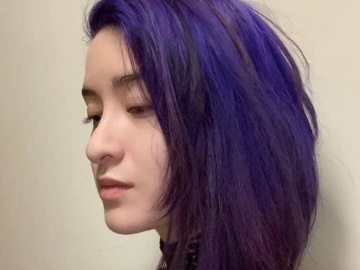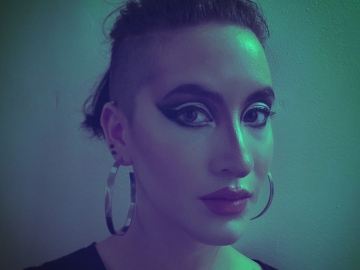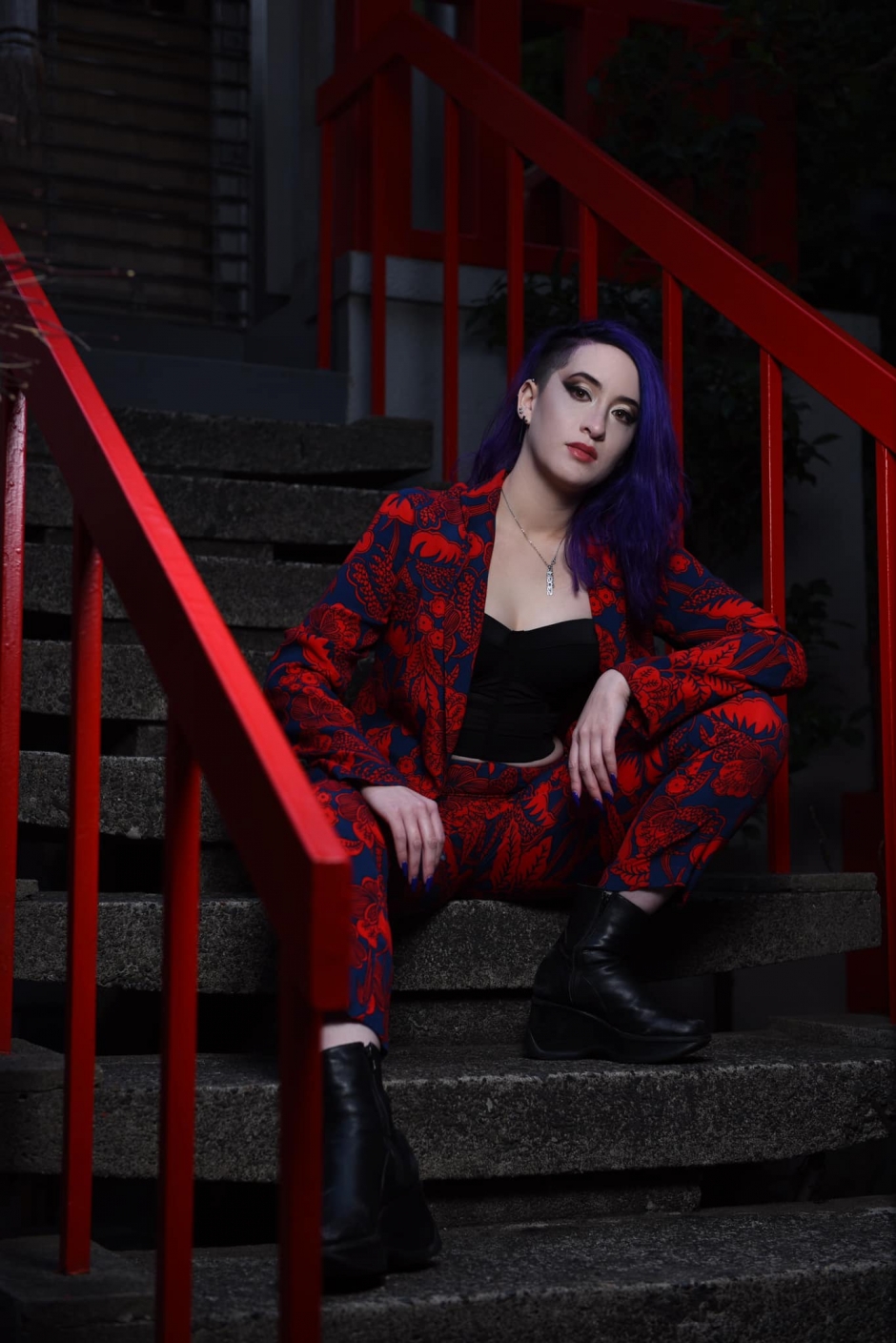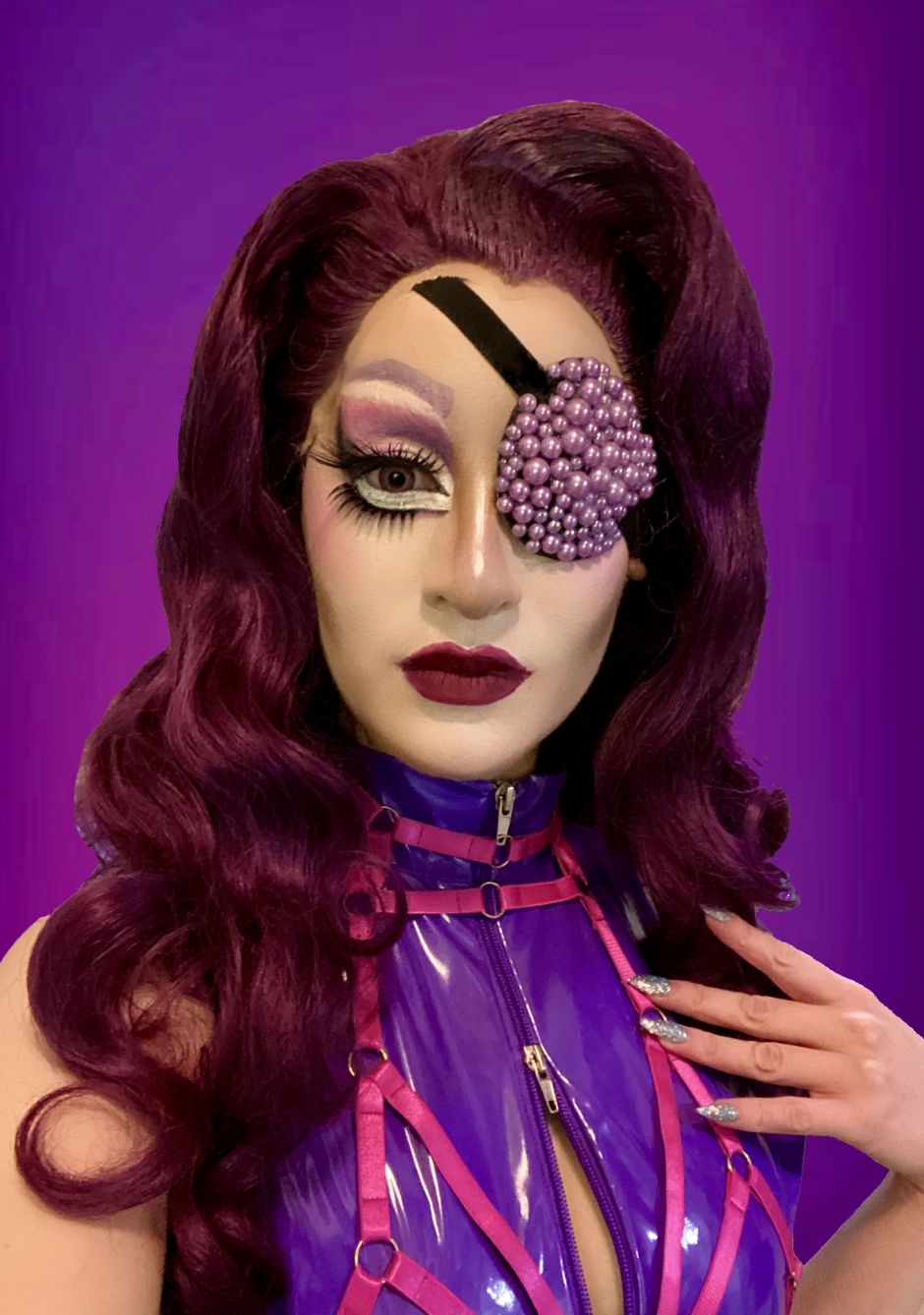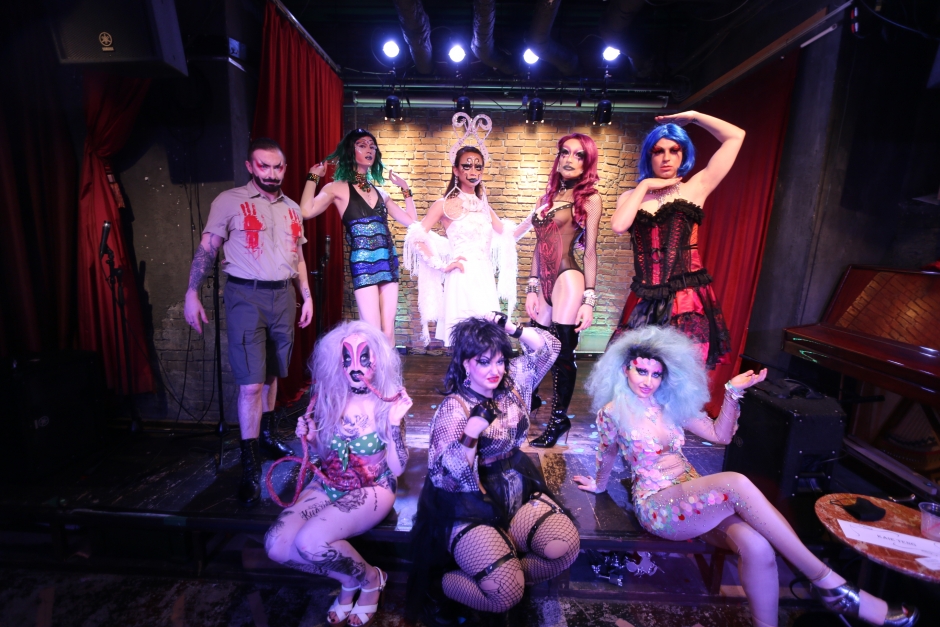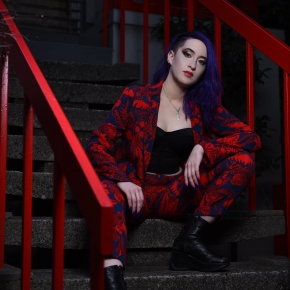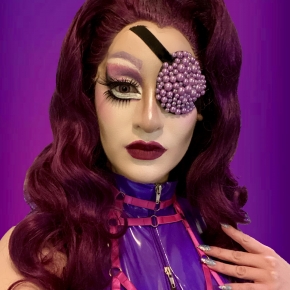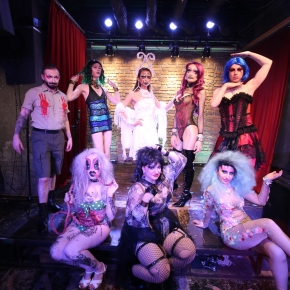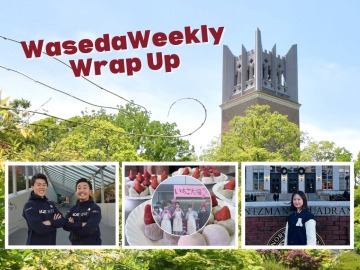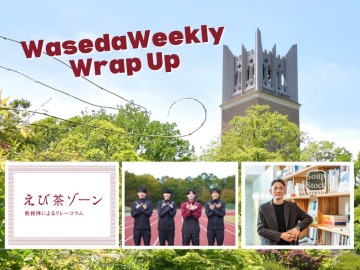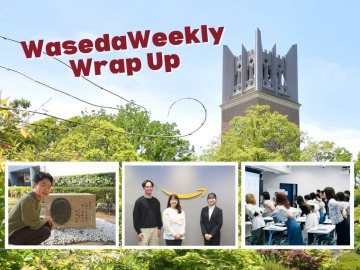“The best part of being a drag queen is feeling your gender disappear “
Kat Joplin completed their Master’s Program at the Graduate School of International Culture and Communication Studies in March 2023
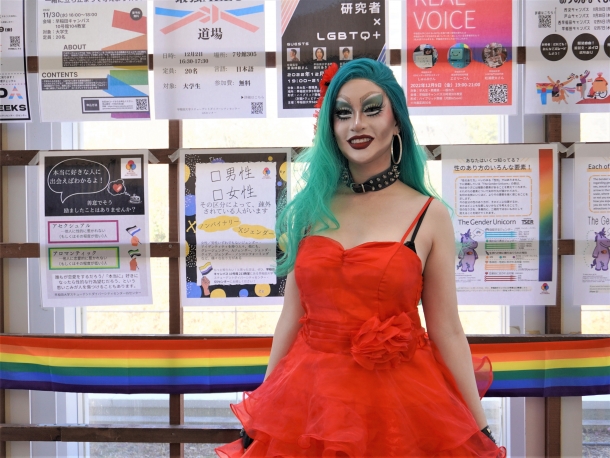
At the Toyama Campus Student Union
Kat Joplin, originally from San Diego, United States of America (USA), is an international student at the Graduate School of International Culture and Communication Studies (hereinafter “GSICCS”), studying Japanese drag queen culture and gender issues. They also appear several times a month clubs in Shinjuku Nichome as the drag queen Le Horla. In 2019, they provided the English subtitles for the movie You Decide and have been actively writing online about LGBTQ topics and drag culture. I interviewed Mx. Joplin, who wears many hats, about why they came to Waseda, the appeal of drag culture, student life, and their future plans.
――Please tell us how you became interested in Japan, and your motivation for coming here.
I am a Vietnamese American who was adopted and raised in a Japanese-American family in San Diego.Therefore, I had many opportunities to experience Japanese culture such as watching taiko drums, practicing karate, and attending Buddhist festivals from a young age. My grandmother was a third-generation Japanese-American, and she spoke fluent Japanese when she was a child.However, she was forbidden to speak it following in the internment camps during World War II and eventually forgot the language. Nonetheless, whenever she saw Japanese people in the neighborhood, she would happily speak with them in a few words she remembered, saying, “I can speak Japanese” (though, this was the only thing she could say!). Observing her in this manner made me want to study Japanese for her. Moreover, I was interested in Japanese pop culture, and I majored in Japanese at Stanford University. When I graduated at the age of 22, I came to Japan, through the JET Program (Japan Exchange and Teaching Program) (※), and taught English at a Junior High School in Oita Prefecture for three years as an assistant language teacher.
(※)A teaching program sponsored by local governments inviting university graduates, whose native language is English, to Japan to promote foreign language education and international exchange.
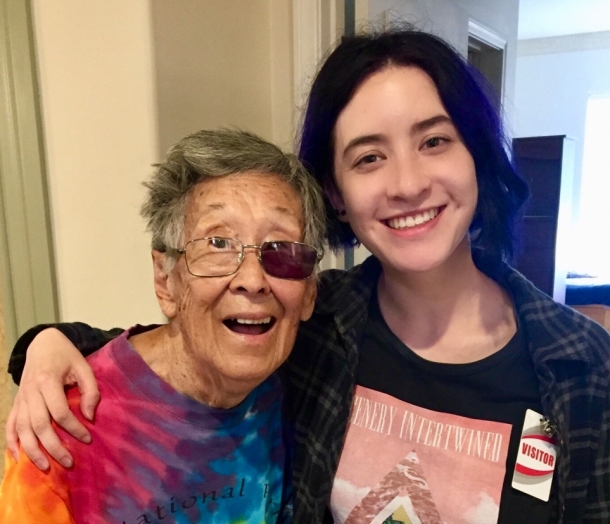
With my Japanese-American grandmother, Connie. My grandmother was pleased that I’ve been enjoying my life in Japan (Mx. Joplin)
――Why did you decide to come to GSICCS as an international student?
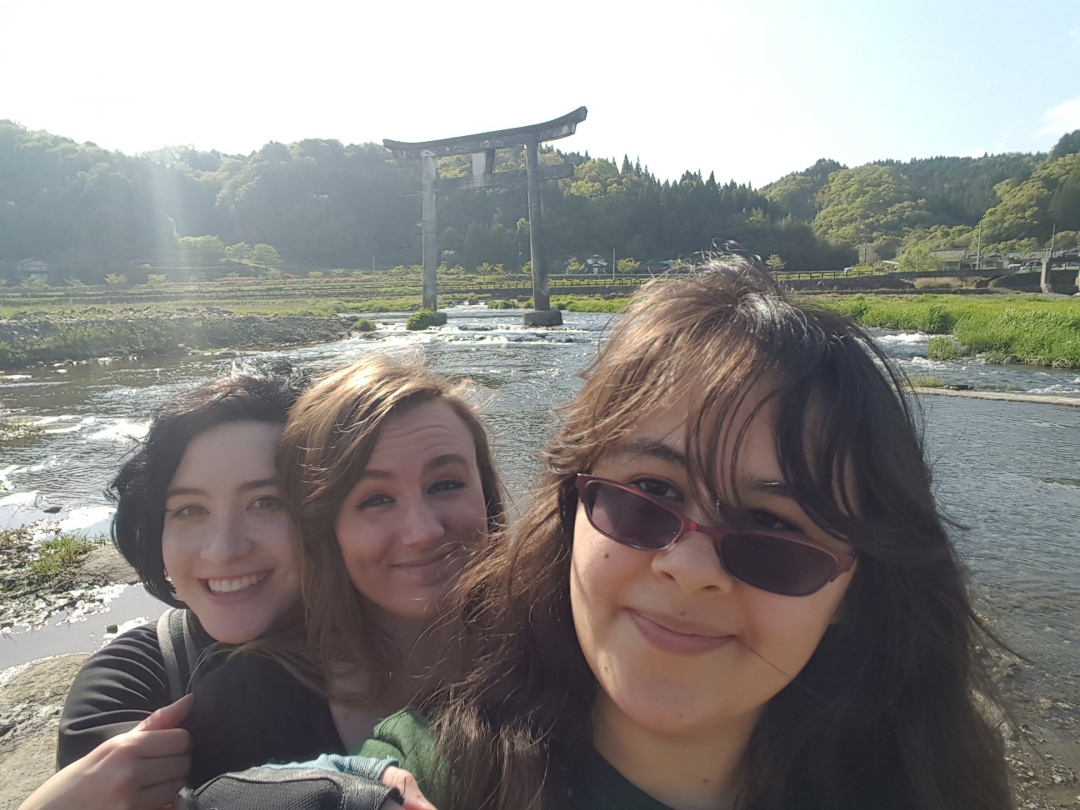
Photograph from Oita Prefecture where Joplin lived for three years while in the JET Program (Joplin is on the left)
I have identified as genderqueer (a gender identity outside of the existing binary) ever since I was a teenager. I first came out when I was in Japan. While I was passionate about teaching English in Oita Prefecture, I also longed to be in an environment with a thriving queer community. Therefore, I moved to Yokohama, where I heard rumors of a developing queer culture in nearby Tokyo. In Yokohama, I studied at a Japanese language school for a year, where I met many friends who identified as queer, and I became widely open about my identity for the first time. Around then, I saw my first drag show, and became fascinated with drag and its culture. Soon after, a friend of mine who was attending Waseda introduced me to GSICCS. I had wanted to acquire a master’s degree someday, hence, I contemplated that GSICCS would provide me the freedom to researchy with various learning opportunities on the subject of drag, which I was so am passionate about. Another reason I opted to study at Waseda is the GS Center (Gender and Sexuality Center) here, which I believed provided a better environment for non-binary and trans students to learn compared with other universities.
――Tell us about your research at GSICCS.

Photograph with members from the Japan Chapter of the House of Mizrahi, the ballroom house to which they belong (Joplin is fourth from the left)
I am strengthening my relationship with the drag community and researching the definition of “queer” in Japan, including the complex gender and policy aspects of Japanese colonial rule. Ultimately, my master’s thesis was on the topic, “Strangers Within the Strange: Interrogating the Intergenerational, Cultural, and Ethnic Divisions in Japan’s Drag Scene.” Specifically, I conducted field research and interviews with the Japanese drag community. I often perform in drag shows in Shinjuku Nichome, and I visited many others in both Tokyo and Kyoto to gather research on the current state of the ever-changing drag culture of Japan. Furthermore, I interviewed active drag queens-my friends, and colleagues. One of my questions was, based on their experiences, how they defined “drag”.
My thesis is much like a love letter to the drag scene in Japan. Through this paper, I expect to convey the history and story of Shinjuku Nichome to as many people as possible.
――Through your own experience and study, please tell us your definition of “drag.” What do you believe is the appeal of drag queens?
Although “drag” in Japan is often understood as gay men dressing up in costumes, in reality, drag performers include diverse types of people, from trans women, to trans men, to non-binaries, to even cisgender women, and even straight people on rare occasions . Any person claiming to be a “drag” performer should be considered as such. I personally believe the art form of drag is completely queer because it involves performances exaggerating and subverting gender.
I am not a gay man, and people often assume I’m straight or a “fag hag”.Therefore, when I walk around Shinjuku Nichome as someone assigned “female” at birth, I feel somewhat insecure, as though I am invisible or not myself. When I dress up as a drag performer, I feel as though I can really be myself. The appeal of being a drag queen is feeling your gender disappear . That is the charm.
Mx. Joplin with various appearances. Makeup transforms them into a different person
――Please tell us about the current state and issues surrounding the understanding of LGBTQ+ people and communities in Japan based on your experiences.
As someone perceived as a “white foreigner from a developed country (※)” and a native English speaker, I enjoy many benefits in Japan. However, as a “queer and transgender non-binary person,” I have experienced bullying, harassment, and discrimination. At my previous workplace, I was reprimanded for shaving my head the way I wanted .
(※)Mx. Joplin is not actually white because of their Southeast Asian roots.
Further, I believe that Japan is slower than other countries to enact laws protecting the LGBTQ+ community. In recent years, many companies and schools have begun to appeal to the practice of “allyship” (the idea of understanding and empathizing with LGBTQ+ people); however, the question of whether or not anything is actually being realized is a completely different story.
Generally speaking I feelWaseda University values diversity, and queer culture is popular among students; I believe many particularly interested students visit the GS Center of Waseda. I expect Waseda will serve as a role model for many Japanese universities and continue to push the boundaries to be at the forefront of a progressive university spirit and community building.

At the Toyama Campus Student Union. Joplin, visiting the campus in a drag style for the first time since enrollment poses in front of various event posters for WASEDA ALLY WEEK 2022 (hosted by the GS Center)!
――Please tell us about your activities as a translator and writer.
In 2019, I was assigned to translate the film “You Decide” directed by Taiki Sugioka. I met the director through the Japanese language school in Yokohama, and he approached me because of my background and understanding of LGBTQ+ terms. The translation process was challenging in some ways; however, I was glad to be a part of this project. Working as a writer has been my long-term career plan. In 2018, I began writing articles for the media published by the JET program aforementioned, and since then, I have continued to write about my perspective on LGBTQ+ topics and drag culture in various publications.
A documentary about Sari Kaede, a transgender icon of the new generation
――Any future goals or plans after graduation?
For the rest of my time as a student (the interview was conducted in February 2023), I wish to spend time with my classmates and seniors at the University and at the GS Center. Further, while my student ID remains valid, I want to go see movies using the student discount. After completing my master’s program, I intend to concentrate on writing and build a career on that front. Moreover, I would like to continue to perform onstage as a drag queen in Japan for now, and to acquire new ideas and further explore the ballroom, which will provide further depth and meaning to my relationship with queer culture in Japan.

840th Issue
Interview, text, and photography: Chiho Katsube, former Waseda Weekly Reporter (SJC student staff), Graduated from the School of Social Sciences in March 2023
【Profile】
 Born in San Diego, USA. After earning a double bachelor’s degree in Japanese Studies and English Creative Writing from Stanford University, they enjoyed a three-year stint at the JET Program in the Oita Prefecture. Following JET, they enrolled in the Graduate School of International Culture and Communication Studies at Waseda University . As an extracurricular activity, they perform on stage as a member of Haus VonSchwarz in Shinjuku Nichome, as well as in other drag shows once or twice a month . They mention the class “Transcultural Dialogue” taught by Professor Akiko Kimura (Faculty of Education and Integrated Arts and Sciences) at Waseda, which examined Japanese women writers from various logical deconstructive perspectives, as having left a special impression on them. They recommend the authors Carmen Maria Machado, Poppy Z. Brite, and Yukio Mishima for LGBTQ+-related books.
Born in San Diego, USA. After earning a double bachelor’s degree in Japanese Studies and English Creative Writing from Stanford University, they enjoyed a three-year stint at the JET Program in the Oita Prefecture. Following JET, they enrolled in the Graduate School of International Culture and Communication Studies at Waseda University . As an extracurricular activity, they perform on stage as a member of Haus VonSchwarz in Shinjuku Nichome, as well as in other drag shows once or twice a month . They mention the class “Transcultural Dialogue” taught by Professor Akiko Kimura (Faculty of Education and Integrated Arts and Sciences) at Waseda, which examined Japanese women writers from various logical deconstructive perspectives, as having left a special impression on them. They recommend the authors Carmen Maria Machado, Poppy Z. Brite, and Yukio Mishima for LGBTQ+-related books.
*This article is a translation from the Japanese edition of Waseda Weekly published on April 25, 2023. The content is current at the time of Japanese publication.

